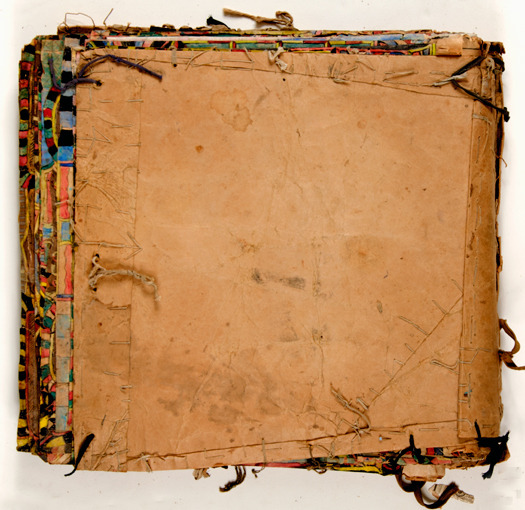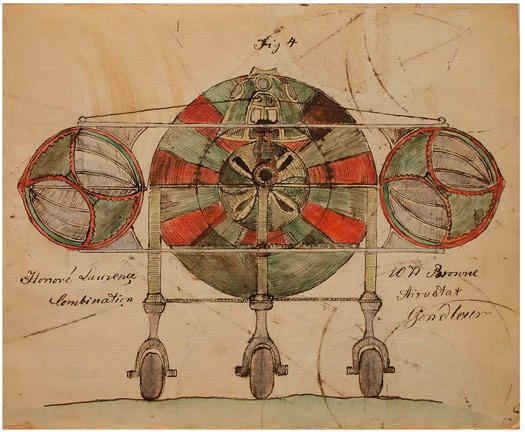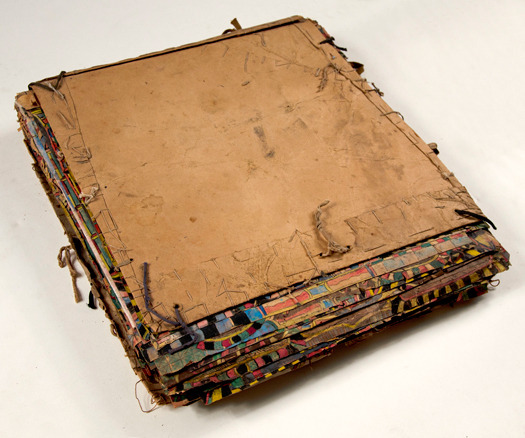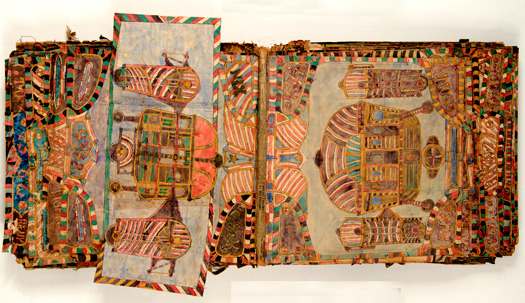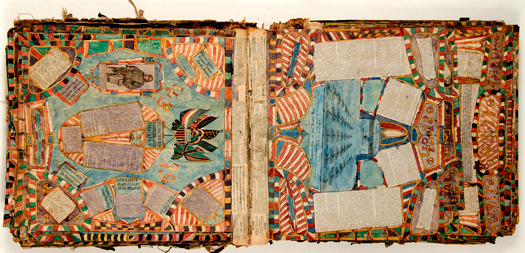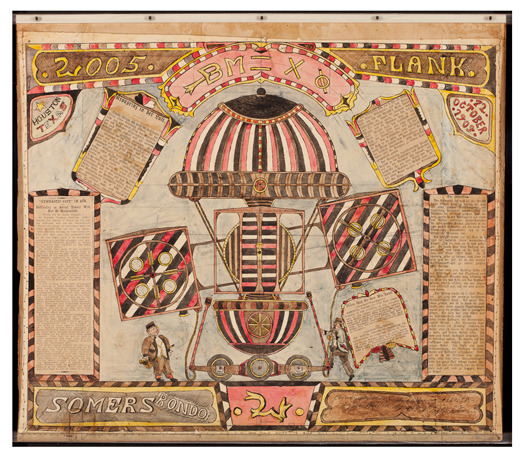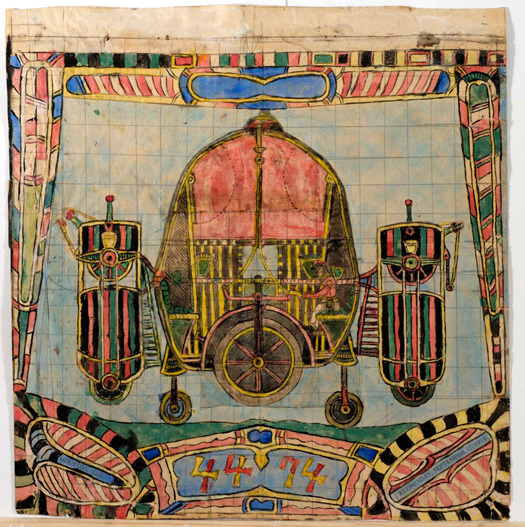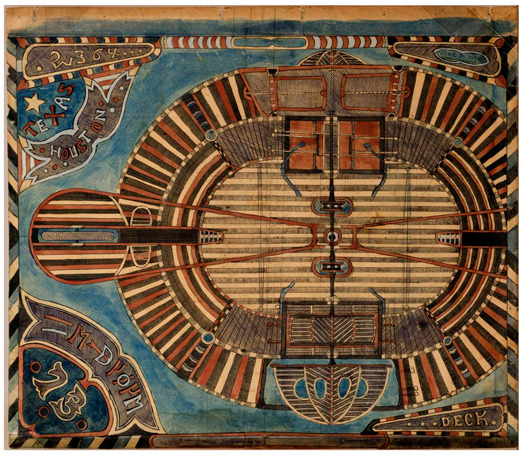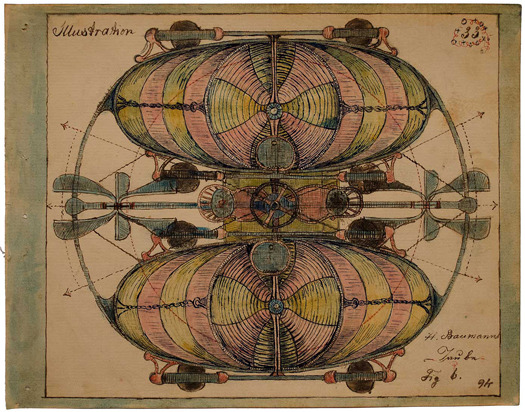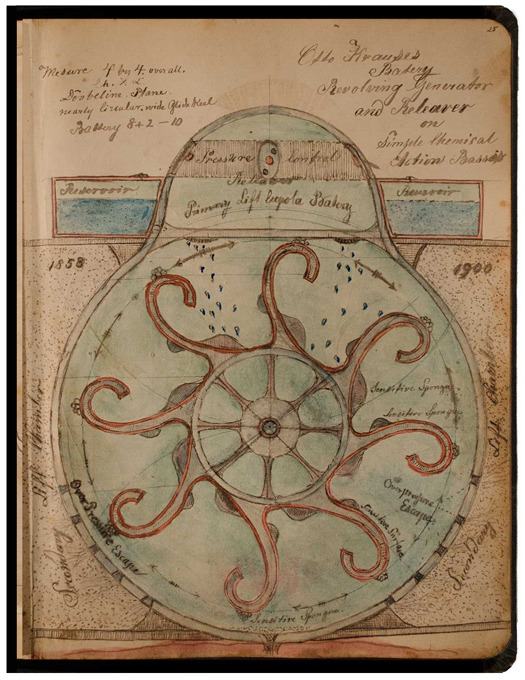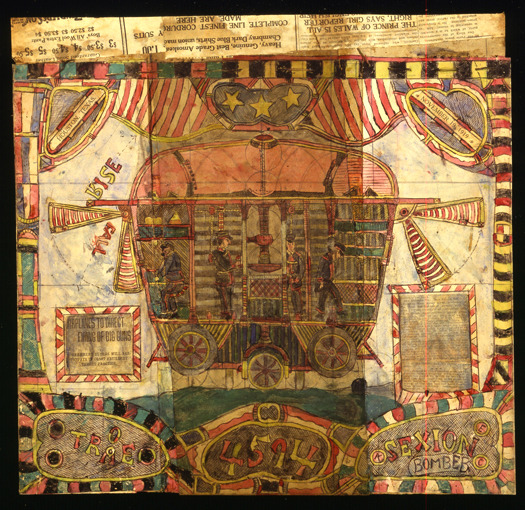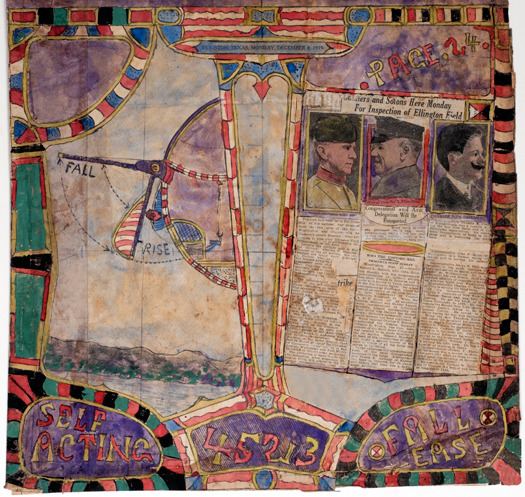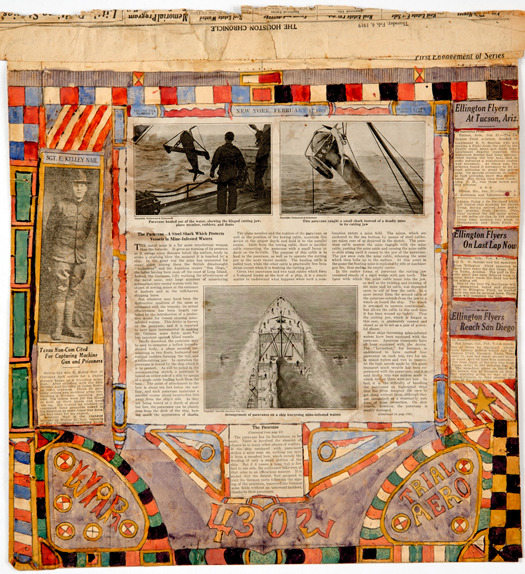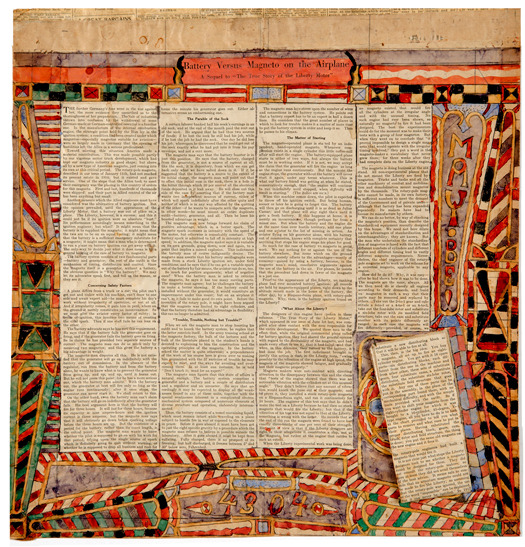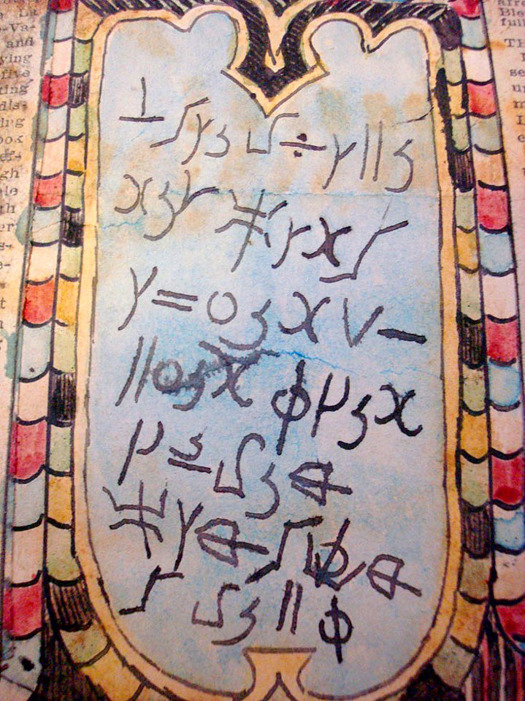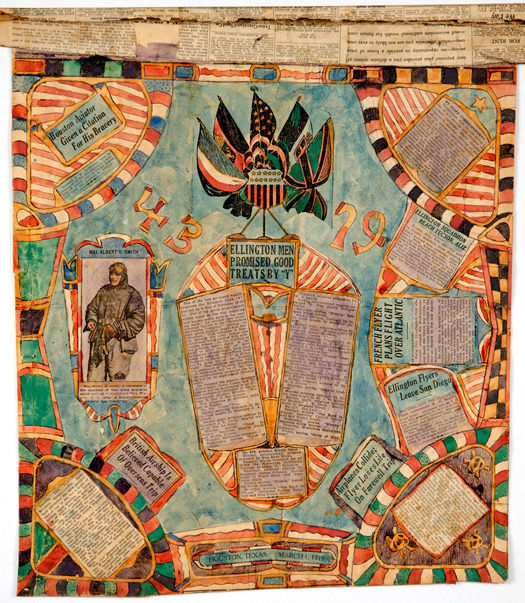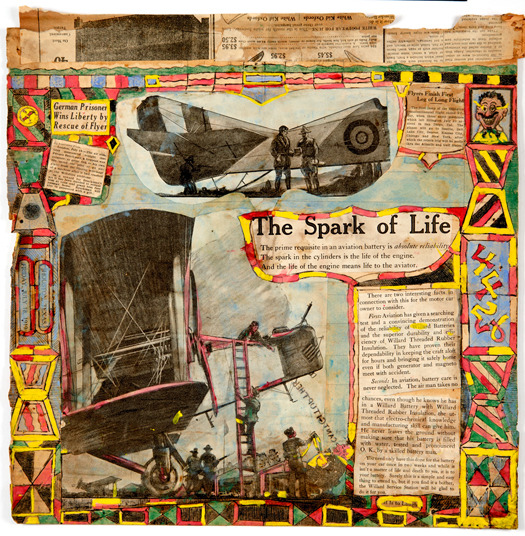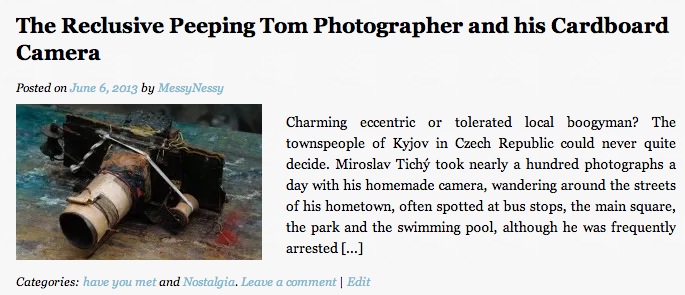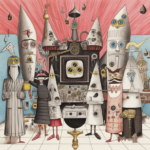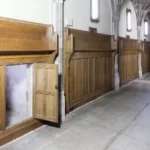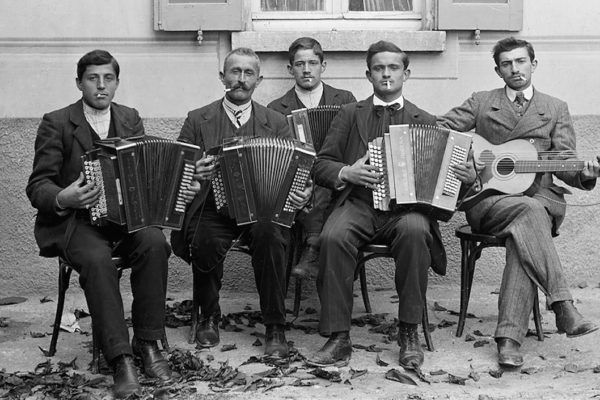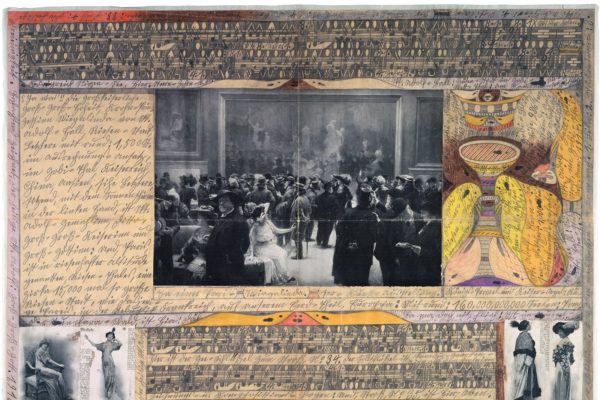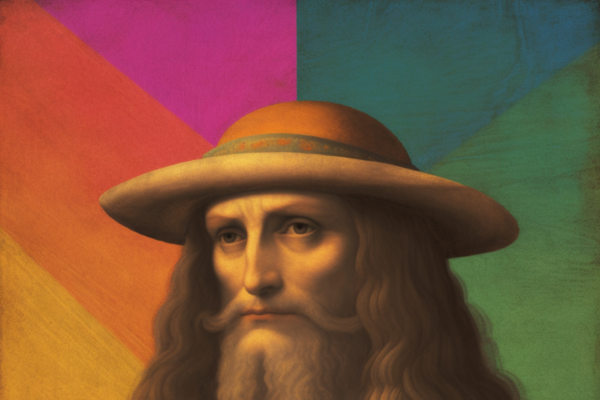His story is one shrouded in mystery, almost lost forever, intertwined with secret societies, hidden codes, otherworldly theories and seemingly impossible inventions before his time. Unseen for decades and salvaged by a junk dealer in the 1960s from a trash heap outside a house in Texas, his entire body of work would later go on to marvel the intellectual world. But during his lifetime, Charles Dellschau had only been known as the grouchy local butcher.
In 1969, used furniture dealer Fred Washington bought 12 large discarded notebooks from a garbage collector, where they found a new home in his warehouse under a pile of dusty carpets. In 1969, art history student, Mary Jane Victor, was scouring through his bazaar of castaways when she came upon the mysterious works of a certain Charles Dellschau. Inside the scrapbooks she discovered a remarkable collection of strange watercolours and collage pieces. More than 2,500 intricate drawings of flying machines alongside cryptic newspaper clippings filled the pages, crudely sewn together with shoelaces and thread.
Victor immediately notified the Art Director of Rice University, Dominique de Menil, Houston’s leading fine art patron, who snapped up four of the books for $1,500 and promptly put on an exhibition at the university entitled, “Flight”. Charles Dellschau, a Prussian immigrant had finally been discovered, nearly 50 years after his death in 1923.
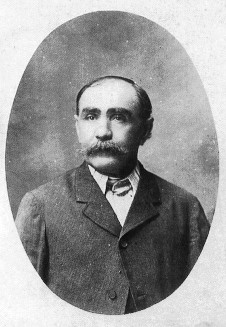 He had arrived in the United States at 25 years old from Hamburg in 1853 and documents show he lived in both California and Texas with his family, working as a butcher. After his retirement in 1899, he took to filling his days by filling notebooks with a visual journal of his youth. He called the first three books, Recollections and recounts a secret society of flight enthusiasts which met in California in the mid-19th century called the ‘Sonora Aero Club’.
He had arrived in the United States at 25 years old from Hamburg in 1853 and documents show he lived in both California and Texas with his family, working as a butcher. After his retirement in 1899, he took to filling his days by filling notebooks with a visual journal of his youth. He called the first three books, Recollections and recounts a secret society of flight enthusiasts which met in California in the mid-19th century called the ‘Sonora Aero Club’.
Charles Dellschau, pictured right.
The Wright Brothers wouldn’t even make their famous first flight until 1903, but Dellschau draws dapperly-dressed men piloting brightly-coloured airships and helicopters with revolving generators and retractable landing gear. No records have ever been found of the Sonora Aero Club but Dellschau’s artworks hide a secret coded story. Whatever it was that he had to say was apparently too private even for his own notebooks and even today, much of the mystery has yet to be revealed.
A Mr. Pete Navarro, graphic artist and UFO researcher, heard about the “Flight” exhibition in 1969 and became enthralled. He believed there was a connection between Dellschau’s drawings and mysterious mass of “airship” sightings at the turn of the century across 18 states from California to Indiana. In 1972, he discovered that 8 remaining books of Dellschau were still sitting at the junk shop, unwanted and unclaimed. He bought the lot for $565 and spent the next 15 years obsessively decoding Dellschau’s work.
Dellschau never draws himself aboard the fantastical aero inventions and represent himself as the club’s scribe/ record-keeper, rather than as one of its inventors or pilots. There are as many as 100 designs for airships with names like the Aero Mary, the Aero Trump and even an “Aero Jourdan”. The club’s secret mission? To design and build the first navigable aircrafts using a secret formula he coded as “NB Gas” which could negate gravity and drive the ships wheels, side panels and compressor motors … all in a day’s work during an era when air travel was still viewed as a mystical impossibility.
Some of his drawings tell of fatal crashes of the society’s airships, sabotage of other club members and the banning of members who talked about the secret organisation to outsiders. According to Dellschau, the club’s aero prototypes would travel the open roads disguised as gypsy wagons to avoid detection.
In the notebooks’ strange code of germanic lettering, Pete Navarro found a phrase that translated as “NYMZA”. Dellschau reveals this to be an even larger secret society that allegedly controlled the Sonora Aero Club branch. Based on Navarro’s findings, UFO theorists have come up with some far-fetched speculation that the NYMZA was in fact an extra terrestrial entity. (When talking about secret societies, I think it comes with the territory).
While Navarro rubbished those claims, he did manage to find press clippings in Texas archives linking one of the names of Dellschau’s secret society members to an article published in 1897 about a local airship sighting. The San Antonio Daily Express article identified one of the airship’s mysterious occupants as Hiram Wilson, who according to witnesses, revealed that his airship design came from his uncle named Tosh Wilson, the very name Navarro had found mentioned in Dellschau’s watercolours as a Sonora club inventor.
But even Navarro, despite his exhaustive research, had his doubts about Charles Dellschau’s story and how much of it was fiction. Were they tall tales to keep an old man entertained? Or were they true accounts of his youth, perhaps innocently exaggerated here and there?
Fiction or not, a single page from Dellschau’s notebooks could fetch as much as $15,000 in the late 1990s. Today, Navarro is no longer in possession of his books; he sold them off in need of some cash to museums, galleries and private collectors in Texas, New York and Paris.
As for how they ended up in a trash heap in the 1960s? The books had been hiding in Charles Dellschau’s attic where he worked for many years before his death. In the 1960s, the husband of Dellschau’s step-daughter, Anton Stelzig was living in the home during the 1960s with his two ageing sisters and a nurse hired to care for them, when the fire department assessed that the house was a hazard and ordered that it be cleared of debris. The nurse was given the task of “cleaning-up”. Her way of doing things resulted in many of the family’s treasures being thrown out onto the street, including Dellschau’s books. Anton’s grandson Leo, painfully recalls the nurse saying, “I took care of that mess and cleaned it all up.” Some of Dellschau’s work is still believed to be missing, possibly lost forever.
In 2009, Pete Navarro finally published his co-written The Secrets of Dellschau, revealing a lot of the script he had decoded from the books. Four books still remain in the Menil Collection, locked in a humidity-controlled room. Researchers continue to unearth new pieces of information through surviving relatives.
A Dellschau enthusiast, William Steen, obtained the aviation enthusiast’s journals in the late 1990s which included details of a secret club boarding house, with a bar and dining room where the society would have meets, dream up their newest flying machines (and probably just have a bit of guy time)!
“The more details I see about Dellschau, the more convinced I am that a great deal of it is highly possible,” he told the Houston Press. “Even though it’s fantastic, it’s more than just fairy tales.”
Sources: The Houston Press, The Observatory via Kateoplis
This year, the first monograph of Charles Dellschau’s artwork (what you’ve been looking at in this article) was published and is available to order here.
-
PS. Discover my own visual cabinet of curiosities for the undiscovered and forgotten on my Instagram
:::
YOU MIGHT ALSO LIKE:
.


